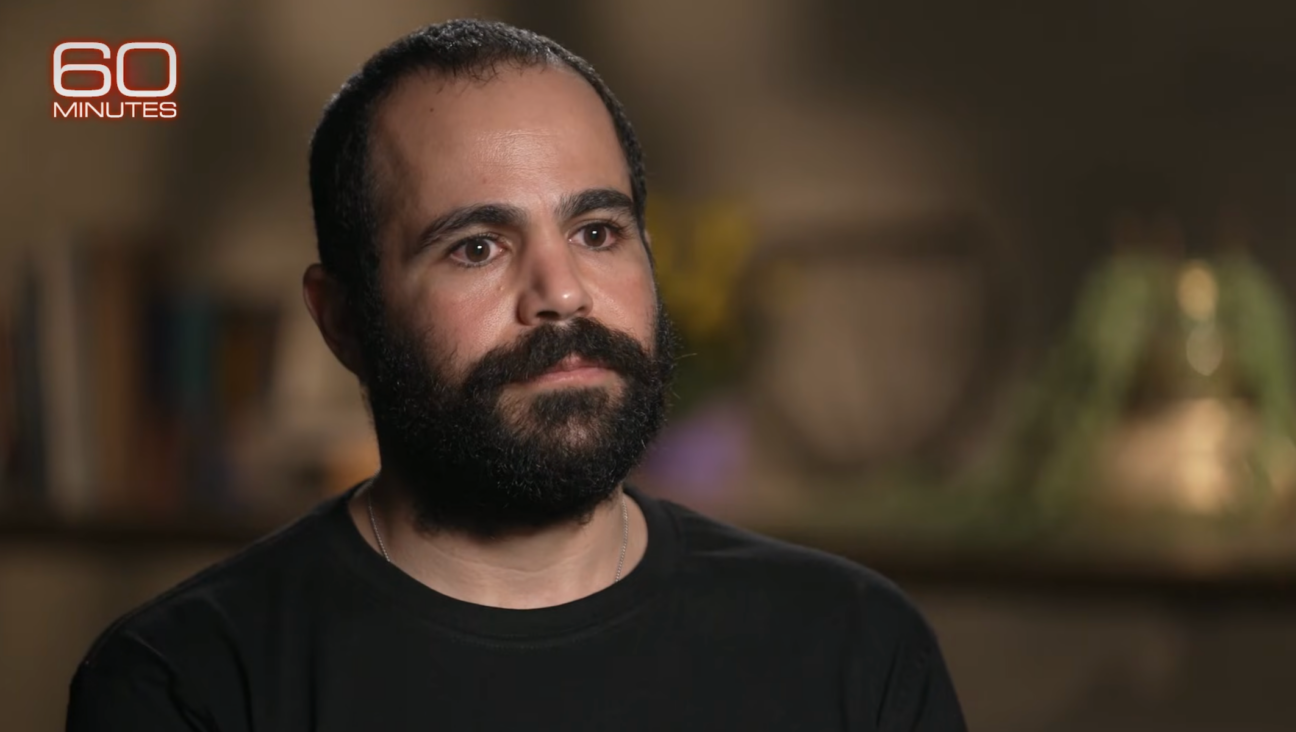Lieberman and Dean Spar Over Support for Israel
Connecticut Senator Joseph Lieberman is hammering former Vermont governor Howard Dean over remarks he made recently about the Middle East conflict. But Dean maintains that he has not retreated from the strongly pro-Israel positions he articulated early in his bid for the Democratic presidential nomination.
The squabble produced fireworks Tuesday at a Democratic primary debate sponsored by the Congressional Black Caucus, with Dean accusing Lieberman of demagoguery.
On the campaign trail last week Dean said that “it is not our place to take sides” in Middle East negotiations and that Israel would need to dismantle “an enormous number” of West Bank settlements.
“His statement was without precedent — it was irresponsible,” Lieberman told the Forward in a telephone interview Tuesday. “We criticize President Bush — all the Democratic candidates — for having separated America from its values and having broken alliances. Dean’s statement would do the very same with regard to Israel.”
“He said Israel should get out of the West Bank,” continued Lieberman, who has supported a two-state solution. “That’s a predetermined outcome that ought to be negotiated between Israelis and Palestinians. That’s taking sides.”
The thrust of Dean’s “no sides” statement, Lieberman said, “divided the Democratic Party from the mainstream of American foreign policy. People have to judge this.”
Dean struck back at Lieberman’s assaults.
“Joe’s just trying to make trouble,” he told the Forward, also in a telephone interview Tuesday. “It’s a disappointment. The position of every Democratic candidate is the same as mine.”
Dean described his position as “not any different than Bill Clinton’s” and said the shape he envisioned of an Israeli-Palestinian settlement looked like the one Clinton, former prime minister Ehud Barak and Yasser Arafat were pondering when negotiations broke off in 2000, with Israel giving up the far-flung settlements but “some big major settlement blocs incorporated.” He reiterated support for the American-Israeli “special relationship” but spoke of a need for the United States to be an “honest broker” and facilitate direct negotiations between the parties.
Lieberman, he said, is the one being divisive. “It’s an attempt to divide the Democratic Party and the Jewish community,” Dean said of the senator’s criticisms. He said he was also disappointed in Massachusetts Senator John Kerry, who echoed Lieberman’s criticism of Dean in a statement. “They’re acting more like George Bush than like a Democrat. That’s why they’re not winning,” Dean said.
Dean rejected the suggestion that his seemingly even-handed rhetoric on Israel, coupled with a recent position he took against racial profiling of Arabs, was a bid for Arab votes in the Michigan primary. “That’s silly,” he said. “I’m not thinking about who’s going to vote where.”
Dean also rejected the suggestion that his position on the Middle East had changed any from an interview he gave to the Forward in November. At the time, Dean was about to visit Israel on an educational trip funded by an arm of the pro-Israel lobbying powerhouse the American Israel Public Affairs Committee. Dean said of the conflict then, “my view is closer to Aipac’s view” than to the view of Peace Now.
That view was seconded by Dean’s national campaign co-chairman, Steve Grossman, a former president of Aipac. “Howard Dean sees himself as a president who from day one will be deeply engaged and will build credibility with all parties to the conflict,” he said. “I don’t think the principles Howard Dean has [espoused] throughout the race have changed at all.”
The dustup brings up issues larger than the Dean, Lieberman and Kerry campaigns, however. The anti-war Democrats who are driving the primary and who have been fueling Dean’s ascendancy represent the segment of the electorate least likely to support the strongly pro-Israel positions that are the consensus of most Jewish communal organizations.
“Clearly that’s going to be a tension for Dean,” said Kenneth Goldstein, a political scientist at the University of Wisconsin. “Many of his core supporters are clearly not of the Aipac position.”
If Dean is seen to be retreating from strongly pro-Israel positions, it might foment tensions in the Democratic Party — a scenario that worries many Jewish Democrats and delights Republican strategists. Jewish voters are the most solidly Democratic bloc except for African Americans — typically, more than 70% vote Democratic in national elections, and almost 80% voted for the Gore-Lieberman ticket in 2000. The party’s pro-Israel policy is seen as crucial to maintaining this support. An organization, the National Jewish Democratic Council, exists to buttress that policy and to propagate the notion that the pro-Israel position of the Democratic Party is a settled matter.
According to former congressman Stephen Solarz, a Lieberman supporter, Dean’s statement calls the solidity of that policy into question.
“It’s a deeply disturbing expression of moral and political neutrality,” he said, which would diminish efforts to end the conflict. As politics, Solarz said, Dean’s position is likely to hurt him, but also to hurt the party. “If you have a race in which people believe the Republican candidate is more supportive of Israel than the Democrat, all bets are off,” he said.
The Dean campaign disputed any notion that such was the candidate’s purpose, producing a letter from a dovish pro-Israel group, the Israel Policy Forum, to provide evidence that Dean’s view is shared by American Jews.
“We appreciate your strong support of Israel,” wrote the group’s executive director, Debra Wasserman. “Moreover, we are pleased that it is informed by the understanding that Israel’s true friends support active U.S. engagement to achieve a negotiated agreement — not policies that preserve the deadly status quo.”
Lieberman’s remarks were the latest sally in a concerted effort to portray as deficient Dean’s knowledge of everything foreign, from security matters to trade. At the Democrats’ debate last week in New Mexico, Lieberman lit into Dean for saying he would not have trade agreements with any nations that did not adopt American labor and environmental standards. Lieberman pressed the point after the debate, telling reporters that Dean’s statement was “outrageous” and “shocking.”
Lieberman’s criticisms of Dean were echoed by strategists for other campaigns, who said Dean’s “no sides” remarks indicated either a woeful lack of experience, a cavalier way with the facts or just a flat-out bad policy. “Either he’s not very knowledgeable or he’s on the wrong side,” said a pollster for Kerry, Mark Mellman. “Howard Dean is saying he wants to take American policy vis-à-vis Israel in a radically different direction than it has been under Democratic and Republican policy for the last 30 years.”
Some Democratic strategists said that the Israel piece of Lieberman’s tiff with Dean was aimed mainly at bulking up Lieberman’s fundraising figures — or at least cutting back Dean’s. Progressive Jewish donors, especially in New York, have been swelling Dean’s campaign coffers, but any perceived Dean weakness on Israel could chill that money flow, these Democrats said. With the crucial third-quarter fundraising figures due at the Federal Election Commission September 30 – and with Dean expected to trounce the field with a projected $12 million to $15 million — “it’s ‘do or die’ for Lieberman,” one Democrat said.
Others, however, credited Lieberman with astute positioning.
“Lieberman has leapt smartly to become the chief alternative to Dean,” said Will Marshall, president of the centrist Progressive Policy Institute. “That’s smart strategy. He’s now zinged him twice on an area in which [Lieberman] is much more deeply versed: trade and the Middle East.”
Marshall wondered why Kerry had yet to display the courage that Lieberman had in challenging Dean. “I’m puzzled as to why the Kerry campaign hasn’t launched a much more sustained critique of Dean on the war in Iraq, trade and other issues,” he said.
The Forward is free to read, but it isn’t free to produce

I hope you appreciated this article. Before you go, I’d like to ask you to please support the Forward.
At a time when other newsrooms are closing or cutting back, the Forward has removed its paywall and invested additional resources to report on the ground from Israel and around the U.S. on the impact of the war, rising antisemitism and polarized discourse.
Readers like you make it all possible. We’ve started our Passover Fundraising Drive, and we need 1,800 readers like you to step up to support the Forward by April 21. Members of the Forward board are even matching the first 1,000 gifts, up to $70,000.
This is a great time to support independent Jewish journalism, because every dollar goes twice as far.
— Rachel Fishman Feddersen, Publisher and CEO
2X match on all Passover gifts!
Most Popular
- 1

Film & TV What Gal Gadot has said about the Israeli-Palestinian conflict
- 2

News A Jewish Republican and Muslim Democrat are suddenly in a tight race for a special seat in Congress
- 3

Fast Forward The NCAA men’s Final Four has 3 Jewish coaches
- 4

Culture How two Jewish names — Kohen and Mira — are dividing red and blue states
In Case You Missed It
-

Books The White House Seder started in a Pennsylvania basement. Its legacy lives on.
-

Fast Forward The NCAA men’s Final Four has 3 Jewish coaches
-

Fast Forward Yarden Bibas says ‘I am here because of Trump’ and pleads with him to stop the Gaza war
-

Fast Forward Trump’s plan to enlist Elon Musk began at Lubavitcher Rebbe’s grave
-
Shop the Forward Store
100% of profits support our journalism
Republish This Story
Please read before republishing
We’re happy to make this story available to republish for free, unless it originated with JTA, Haaretz or another publication (as indicated on the article) and as long as you follow our guidelines.
You must comply with the following:
- Credit the Forward
- Retain our pixel
- Preserve our canonical link in Google search
- Add a noindex tag in Google search
See our full guidelines for more information, and this guide for detail about canonical URLs.
To republish, copy the HTML by clicking on the yellow button to the right; it includes our tracking pixel, all paragraph styles and hyperlinks, the author byline and credit to the Forward. It does not include images; to avoid copyright violations, you must add them manually, following our guidelines. Please email us at [email protected], subject line “republish,” with any questions or to let us know what stories you’re picking up.














